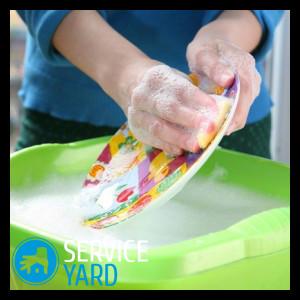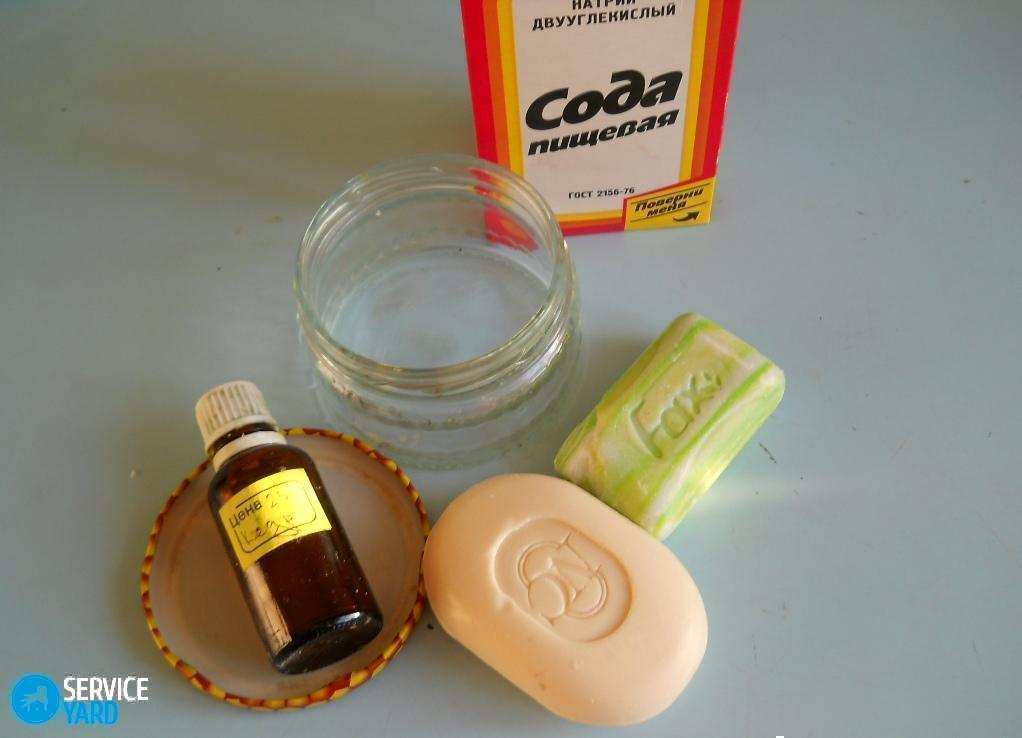DIY dishwashing detergent

In the modern market, the buyer is provided with a huge selection of all kinds of household cleaning products, including dishwashing liquids. But often the price of high-quality effective funds is high. In addition, the composition of purchased detergents has many components that adversely affect health. But you can turn to "grandmother's recipes" and prepare a dishwashing detergent with your own hands, while spending a minimum of money.
to contents ↑Homemade dishwashing detergents - what are the options?
Homemade products vary in the quality of cleaning dishes, but in any case, they are several times cheaper than purchased liquids, and rarely cause allergies due to the fact that you determine the most suitable composition yourself. And among the whole variety of recipes for the independent preparation of such liquids and gels, you can choose the most effective.
Consider several recipes on how to make a dishwashing detergent at home.
to contents ↑Soap and Soda Detergent
Such a tool is suitable not only for washing dishes, but also for cleaning various surfaces in the house, including for washing plumbing.
Important! The composition does not contain substances that could cause allergies or cause any harm to the environment, so the product can be safely called environmentally friendly.
Components
To make it, you will need the following ingredients:
- Baby or household soap (1 piece);
- Baking soda (250 g, or half a pack);
- Hot water (0.5 l, or two glasses).
How to cook:
- Rub a piece of soap on a grater and fill it with hot water. The soap should dissolve.
- Beat the mixture until a thick soapy foam forms.
- In the process of whipping, add a little soda.
- If you have a desire to give the product a pleasant aroma, then add a few drops of a pleasant essential oil.
Transfer the finished product to a suitable container, such as a bowl or plastic container.
to contents ↑Important! Such a dishwashing detergent prepared by oneself, despite its simplicity, is strong enough and cleans even limescale (you just need to hold it a little longer so that the substance has time to act at full strength).
Dishwashing liquid
Anyone can prepare such a dishwashing detergent with their own hands.
Important! It easily and quickly rinses off fat, and although it is spent less economically than purchased liquids, it comes out at a much cheaper cost.
Components
To prepare the liquid you will need:
- Hot water (0.5 L, or 2 cups);
- Laundry soap (25 g);
- Glycerin (4 tablespoons);
- Vodka (1 tablespoon).
How to cook:
- Grated soap, pour a small amount of water and put to heat in a water bath.
- Gradually pour all the water into the mixture so that the soap completely dissolves.
Let the finished base cool, then add glycerin and vodka. - Stir everything until a homogeneous mixture is obtained, remove the resulting foam from the surface.
- Pour the finished product into a bottle with a dispenser and let it brew for several hours.
Important! Instead of a water bath, a microwave can be used to heat the solution.
When thickened, the liquid turns into a gel, which forms a thick foam when used, and the glycerin contained in the composition does not allow the active substances to dry the skin.
to contents ↑Gel-paste for washing dishes
The gel can be used to wash dishes and various surfaces in the house.
Important! It is suitable for dealing with severe pollution: you need to put the finished detergent on the desired area and leave for a few minutes, and then just wipe it with a damp sponge or cloth.
Components
To create a gel for washing dishes at home, you will need:
- Hot water (0.5 L, or 2 cups);
- Laundry soap (25 g);
- Baking soda (3 tablespoons);
- Ammonia (4 tablespoons);
- Mustard powder (3 tablespoons).

How to cook:
- Grate a piece of laundry soap on a fine grater, add water and wait until all the chips have dissolved.
- To the cooled liquid base we add mustard, soda and ammonia, mix thoroughly.
Important! Ammonia can only be used outdoors or in a well-ventilated area.
- The finished gel should be placed in a suitable container, closed so that ammonia does not disappear, and left for several hours.
- After that, the product is ready to use.
Mustard as a dishwashing detergent
If you do not want to bother with the preparation of washing fluids, you can use the usual mustard powder:
- It is necessary to dilute a small amount of powder in water and moisten the sponge in the solution during washing.
- If there are very few dishes, then just pour the mustard directly on the sponge.
After applying mustard and rinsing, there will be no trace of fat!
to contents ↑Important! Mustard dries the skin of the hands. To avoid undesirable consequences, you can use a greasy cream or glycerin after contact with a product that contains mustard. The latter can be added to the product during cooking.
Peroxide and Soda Detergent
If you need to clean glass or any surface, but it is difficult to wash off the soap foam, and mustard scratches the material, then you can make a dishwashing detergent with your own hands without soap and mustard powder. It is not necessary to wash off such a liquid, and if you still want to remove it from the surface, just wipe the surface with a sponge or rag.
Components
The composition of such a tool is very simple. You will need:
- Hot water (250 ml, or 1 cup);
- Hydrogen peroxide (1 teaspoon);
- Soda (1 teaspoon).
How to cook:
The ingredients are mixed, the finished liquid is poured into a spray bottle and sprayed onto contaminated sites.
to contents ↑Important! The liquid is ideal for washing glassware, tables, stoves and sinks. It can also be used as a stain remover when washing things.
The main advantages and disadvantages of homemade detergents
Homemade dishwashing detergents have several advantages over purchased ones:
- All components are in the penny store, so the tool will cost much cheaper than any purchased. In addition, most of the ingredients are at home for everyone, so to prepare a small amount you do not need to go to the store in search of everything you need.
- They do not have substances that could harm health, including causing allergies, and the environment.
- Easy to rinse, not remaining on the dishes after rinsing, but making the dishes clean.
But such liquids have their drawbacks:
- It will take some time to prepare, while purchased items are sold ready-made.
- Home-made detergents are consumed much faster than purchased, stocks will often have to replenish.
- The quality of washing may be slightly worse than that of purchased ones. However, after some time, you will find tools that suit you.
Stock footage
But even with such a consideration of the situation, the advantages cover the disadvantages, because health and safety are important, and the time spent pays off in full.
All health and cleanliness in the kitchen!
- How to choose a vacuum cleaner taking into account the characteristics of the house and coatings?
- What to look for when choosing a water delivery
- How to quickly create comfort at home - tips for housewives
- How to choose the perfect TV - useful tips
- What to look for when choosing blinds
- What should be running shoes?
- What useful things can you buy in a hardware store
- Iphone 11 pro max review
- Than iPhone is better than Android smartphones



